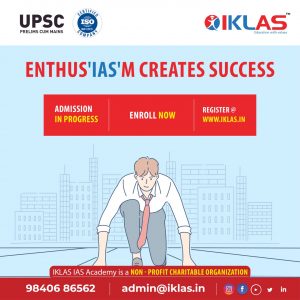Blogs
How should you prepare for UPSC as a beginner?
As a student who has realized their ambition is to become an IAS officer, we would like to commend your clarity of mind. It’s a wonderful thing to realise your life’s ambition. In order to nurture your ambitions, Iklas IAS Academy recommends the following things to start your preparation for the civil services exam.
One advice that is important to follow is to regularly do tasks that need to be completed, like your homework/assignments every day. By working towards your goal regularly, you can achieve tremendous success.
In order to have an advantage over other students, it is important for the school-aged children who are preparing to study their textbooks thoroughly. This will help them understand the concepts that they will need to learn for the UPSC/IAS exam. The school syllabus forms the foundation of the UPSC/IAS exam and knowing your NCERT class material in depth is a good start for your UPSC exam. You should focus on History, Geography, Civics, Science, and Maths courses as they form the very basics of your preparation. By learning these subjects, and revising them multiple times you can cover almost 50% of your UPSC/IAS exam preparation.
As of right now, confine yourself to reading the NCERT books up to the class which you are studying currently. If you have any difficulty understanding a concept or idea, remember to use Youtube videos to clarify your concepts. There are great resources available online that you can use to make your studies fun and easy to understand. This will help you remember your concepts longer.

In addition to this, the UPSC/IAS exam asks questions from mathematical concepts that you learn up to class X. Many students get afraid because they think they are not good at maths. This is not true. Maths is hard because they do not practice enough. Once they understand a topic and practice it many times, they can easily score good marks. This principle is applicable to all subjects.
Another way you can boost your IAS/UPSC preparation is by testing yourself on the topics that you learned. By giving tests, you can understand your concepts better. It will also show you where the gaps in learning come from. You can then study in a way that covers the concept fully and you can close any gaps in knowledge/subject matter. By giving more tests you can understand how much of a topic you know and you have to focus on learning that topic accordingly. As you are in school, you can dedicate a lot of time to learning your NCERT books thoroughly.
Now that we have focused on the basics of how you should prepare, let’s turn our attention to the extra preparation you need to start to make yourself a strong candidate. To write the UPSC exam, you don’t need fancy language. What matters is if you understand a topic and can provide relevant points in an organized manner within 200 words. For example, select a topic and dissect it along the lines of ‘How’, ‘What’, ‘Why’ and if relevant, ‘When’ and ‘Where’. In addition to these topics, you need to think about ‘Major Causes’, ‘Impact’ ‘Way Forward/Solutions’.
By becoming disciplined and systematic you can improve your writing and subject matter knowledge. In addition to practicing your answer writing skills, you need to improve your general knowledge. To do this, you can start reading the newspaper. Read topics that are of national and international importance. The UPSC/IAS exam will not focus on regional issues. By reading any major newspaper you can improve your general knowledge as well as improve your language. If you have trouble understanding the editorials. That is okay. Talk to your parents. Ask them to help you understand the nature of the editorials. Over time, it will become easy to understand as you will see the issues repeating and you can understand it more.
By following these simple suggestions you can not only do well in school but also be prepared for the UPSC/IAS exam. We hope you can follow these guidelines and grow into the kind of person who is knowledgeable, well-read, and able to work hard even when things are difficult. We wish you the best of luck!

